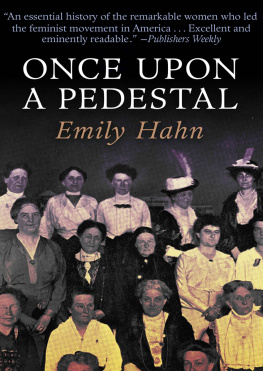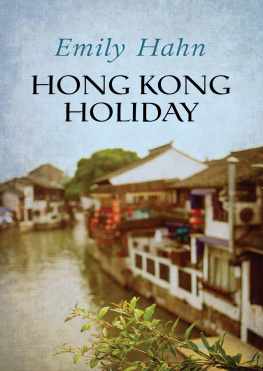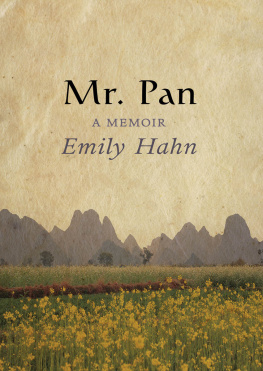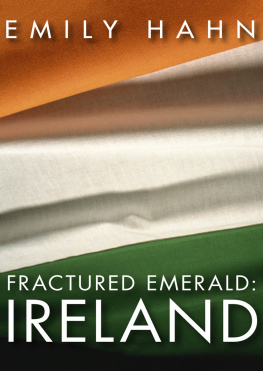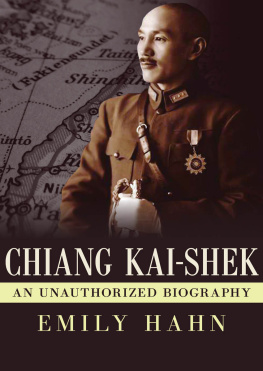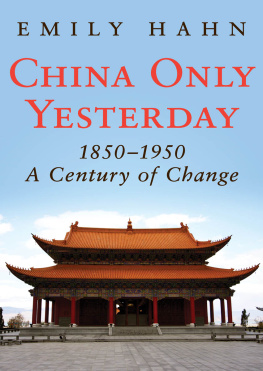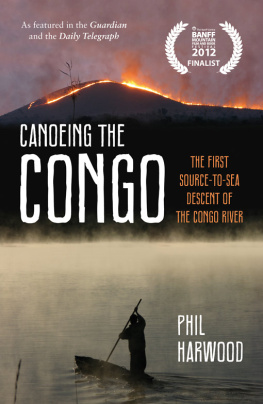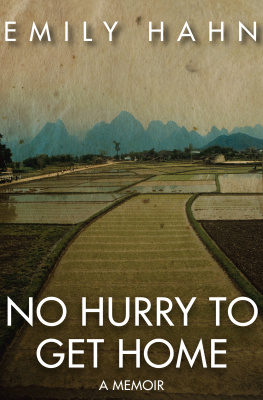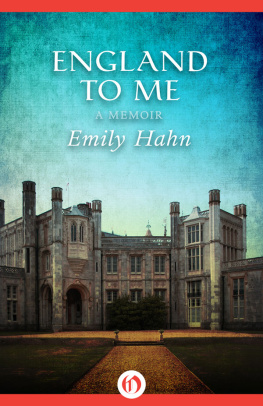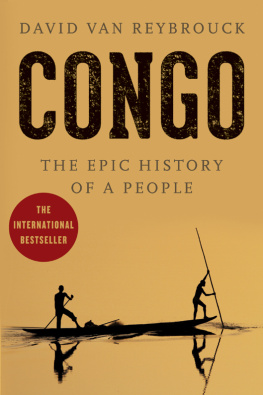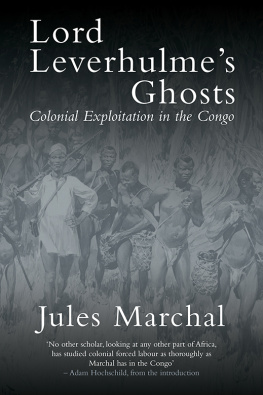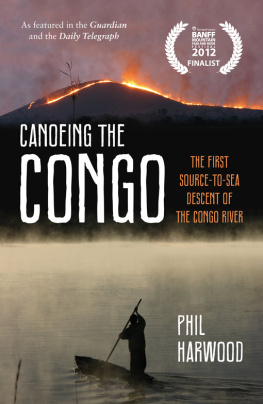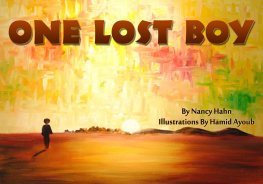Congo Solo
Congo Solo
Misadventures Two Degrees North
EMILY HAHN
Edited and with an Introduction
by Ken Cuthbertson
Foreword by Anneke Van Woudenberg

McGill-Queens University Press 2011
ISBN 978-0-7735-3904-4
Legal deposit third quarter 2011
Bibliothque nationale du Qubec
Printed in Canada on acid-free paper that is 100% ancient forest free
(100% post-consumer recycled), processed chlorine free
McGill-Queens University Press acknowledges the support of the Canada Council for the Arts for our publishing program. We also acknowledge the financial support of the Government of Canada through the Canada Book Fund for our publishing activities.
Unless otherwise indicated, all photos are published courtesy of the Hahn Estate.
Library and Archives Canada Cataloguing in Publication
Hahn, Emily, 19051997
Congo solo : misadventures two degrees north / Emily Hahn ; edited and with an introduction by Ken Cuthbertson.
Includes bibliographical references.
ISBN 978-0-7735-3904-4
1. Hahn, Emily, 19051997TravelCongo (Democratic Republic). 2. Congo (Democratic Republic)Description and travel. 3. Congo (Democratic Republic)Social life and customs. 4. Congo, Belgian. 5. Women travelersUnited StatesBiography. 6. Authors, American 20th centuryBiography. I. Cuthbertson, Ken II. Title.
PS 3515. A2 4 22Z 465 2011 967.51024092 C 2011-901881-0
Designed and typeset by studio oneonone in Janson 10/14
FOREWORD
When I first read Congo Solo, I knew I had met a kindred spirit in Emily Hahn, its author. Here was a woman who, like me, had gone to Congo for escape and adventure but left deeply changed by what she experienced. Hahn jumped out from the pages as gutsy, adventurous, and impulsive, with a devil-may-care attitude. She was interested in the Congolese people, got to know them, and heard their stories. The injustices the Congolese people suffered, so evident to Hahn in 1931, touched her. Through her curiosity, her eyes were opened. She witnessed the cruelty firsthand and began to question those responsible. I liked her.
Hahns adventure in the Belgian Congo began in a way surprisingly similar to my own. I have worked in the Democratic Republic of Congo, as it is called today, for twelve years: first for Oxfam Great Britain and currently for Human Rights Watch. It seemed Hahn and I had both gone to Congo for all the wrong reasons. On a whim, Hahn set out for Congo in 1931 seeking adventure, following a romantic notion, and looking to escape the drudgery of the Great Depression. Some sixty-eight years later, I too set out for Congo on a whim. When I complained of being miserable in my job in the financial industry in London, a close friend dared me to take a humanitarian job in war-torn Congo. Rarely one to turn down a dare, following a fight with my boyfriend I decided a Congo adventure was just what I needed. In the summer of 1999, I packed my bags, said my good-byes, and thought little about what I might encounter.
Like Hahn, I arrived in Congo to be met with the intimidating, and in hindsight amusing, arrivals ritual. Recognizing that I was new to the country, a Congolese immigration official immediately took me aside, methodically examined my documents, and then proceeded to explain, in a very authoritative manner, that they were not in order. I was told I would need to apply for the correct visa if I wished to leave the airport that evening. And, of course, the correct visa would cost more money. I was amused to learn that in 1931 Hahn had encountered a similar routine when she arrived by boat at the port town of Boma. It seems the attempt to scam money off unsuspecting foreigners has a long history. In each of our cases, we were saved by the kindness of a stranger and entered the country with a huge sigh of relief.
In Congo Solo, Hahn describes her marvelous adventure crossing the country. The journey is an extraordinary feat, especially for a single woman in the 1930s. Her descriptions of what she encounters make for fascinating reading. She vividly details her journey from the port of Boma to Kinshasa in the west, then on to Penge in the north-east by rail, boat, car, and pirogue (a wooden dug-out canoe) to reach the village where her humanitarian friend is managing a Red Cross medical centre. Months later she continues her journey, trekking on foot further eastward through the Ituri forest and over the green hills of what is today North Kivu province to reach east Africa.
Reading it, I was envious of her journey. How I wish it was possible to do a similar trek. But that is one of the stark differences in the Congo that Hahn describes and the Congo of today. In the years that have passed between Hahns arrival and my own, the Congo has regressed rather than progressed. Congo is now less developed than it was in the 1930s. Most of the trains and boats no longer run, the roads are dilapidated and often impassible, and the countryside is overrun by dozens of marauding armed groups who prey on civilians. Hahns journey, difficult as it was at the time, would be nearly impossible today.
There has been regression in other important areas as well, mostly notably in the daily lives of Congolese civilians. Hahn describes the suffering she witnessed in the 1930s, including mass forced labor and the starvation that followed. Hahns description of how thousands of Congolese were forced to construct roads by the Belgian colonial authorities shows she was far from blind to the horrors the policy caused.
In her own way, Hahn tells the story of these earlier times. It is not a book about these abuses she was not a human rights activist but a literary travel writer but the absurdity and abusive nature of the colonial authorities is blindingly apparent. Hahn is genuinely open to getting to know Congolese people and, when she does, she becomes increasingly aware of the cruelty and unfair treatment they suffer. What she witnessed made her question her own preconceptions about Africans and about her fellow whites. Her anger at the abuse, and her courage to begin to take steps against it, is an important part of her experience in Congo. It also places her firmly in the tradition of other eminent literary travelers who bore witness to the sufferings of people in central Africa and beyond, such as Joseph Conrad, Graham Green, V.S. Naipaul, and Andr Gide.
Sadly, the suffering in Congo continues. Today Congo carries the tragic label of the site of the deadliest war in the world. An estimated five million people have died since 1998, some directly from the violence, many others due to hunger and the lack of medical care. Over 200,000 women and girls have been raped. The recent violence is at the hands of predatory Congolese and foreign rebel groups, armies from neighboring countries attracted by Congos vast mineral wealth, and the countrys own soldiers, who prey on civilians rather than defending them. But, as we see from Hahns writing and that of others, this story of tragedy is not new. Congo has suffered horribly throughout its history at the hands of foreigners and its own officials. Powerful outside interests have often been directly to blame but the victims are always the same: ordinary Congolese people.
In early 2010 I was in Tapili, a village in north-eastern Congo not far from Penge, where Hahn was based for eight months. I was following up on reports about a massacre by the Lords Resistance Army ( LRA ), a Ugandan rebel group based in northern Congo who are notorious for their brutal killings and abduction of children. A colleague and I had been dropped off by a small plane on a nearby dirt airstrip, the only way to cover significant distances these days. From there we took motorcycles to reach the affected area, crossing makeshift log bridges and following a path that in colonial days had been a road. We found devastation and a population traumatized by what had happened. In the days that followed, we documented how the LRA had killed more than 321 civilians and abducted more than 250 others in a well-planned four-day attack. The vast majority of those killed were adult men, who were tied up before LRA combatants hacked them to death with machetes or crushed their skulls with heavy wooden sticks.
Next page

